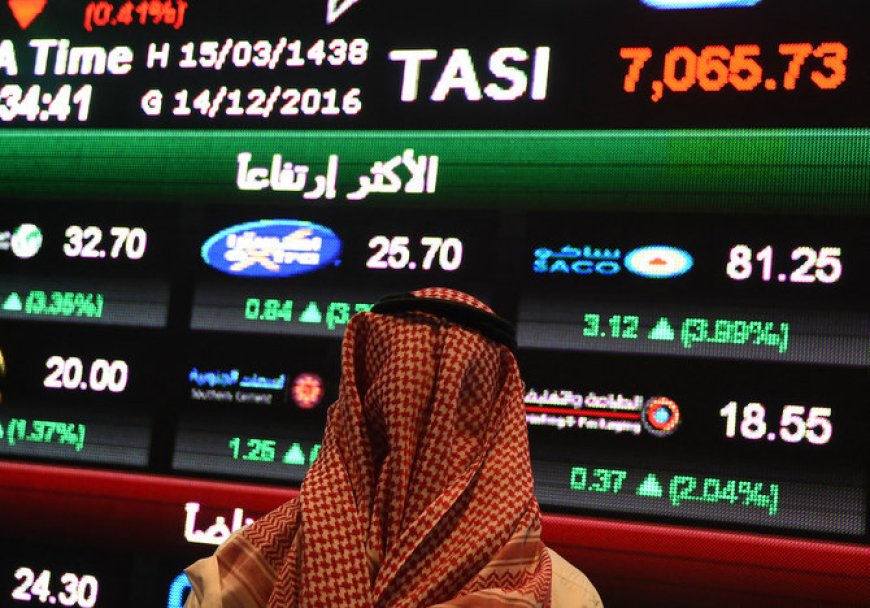Saudi Stock Market Growth Following Trump's Shift in Trade Policy
History shows that U.S. relations with its regional allies are prone to sudden shifts, often driven by changes in government, shifts in domestic priorities, or international political pressures. Referring to past fluctuations in U.S. relations with countries like Egypt, Pakistan, and even Saudi Arabia during Biden’s presidency, some economic observers warn that a change in administration or a reassessment of U.S. global trade policies could seriously challenge the stability of Saudi financial markets Against this backdrop, it is recommended that Saudi Arabia adopt a balanced strategy that reduces its economy’s vulnerability to external developments, rather than relying unilaterally on the United States.

"Saudi Stock Market Growth Following Trump's Shift in Trade Policy"
With Donald Trump’s return to the political scene and changes in his trade approach compared to his first term, financial markets across parts of West Asia — including Saudi Arabia — have experienced positive momentum. A clear manifestation of this shift has been the recent growth in Riyadh’s stock market indices, which analysts interpret as a sign of increased investor confidence, largely driven by Trump's unofficial support for Saudi Arabia’s major economic projects, particularly the Vision 2030 plan.
Unlike Trump’s confrontational stance toward China and the European Union, his recent positions suggest a move toward fostering preferential economic ties with Washington’s traditional allies, especially in the Middle East. Saudi Arabia has welcomed this shift, sending a positive signal to its financial markets.
The main index of the Saudi stock exchange has recorded several percentage points of growth in recent weeks, reaching its highest levels in months. Besides the rising oil prices, this growth is attributed to optimism over strengthened Riyadh-Washington economic ties, reduced geopolitical risks, and an uptick in foreign investment in Saudi capital markets.
Vision 2030, introduced by Crown Prince Mohammed bin Salman, stands as one of the most ambitious economic and social reform programs in Saudi Arabia’s modern history. It aims to reduce the kingdom's dependence on oil, expand the private sector, attract foreign investment, and modernize infrastructure.
In recent months, Trump has repeatedly praised Saudi Arabia’s major economic projects, especially NEOM city and renewable energy initiatives, in his speeches and interviews, framing them as examples of "Middle Eastern progress under America's friendly leadership." Although these endorsements have not taken the form of formal agreements, they have nonetheless been perceived as political signals, boosting global investor confidence in Saudi Arabia’s economic stability and future.
While the Saudi stock market's reaction to these developments has been notably positive, some analysts warn against Saudi Arabia’s growing economic reliance on the United States — especially given that many of its strategic projects are intertwined with American companies and institutions in terms of technology, investment, and political backing.
This growing dependency leaves Saudi financial markets highly vulnerable to sudden decisions from the White House. Changes in U.S. trade or tax policies, the imposition of new restrictions on foreign trade, or even a change of administration could directly impact the stability of Saudi stock markets.
Several Arab economists, citing available evidence, argue that excessive reliance on external support could slow down structural reforms in Saudi Arabia's economy. According to these experts, the success of Vision 2030 hinges on domestic efforts: reforming the tax system, strengthening regulatory institutions, increasing public sector efficiency, and nurturing a vibrant local private sector — goals that require internal commitment rather than external dependence.
There are growing concerns that if the Saudi government becomes too encouraged by mounting support from Washington, it might show less motivation to develop domestic capacities, foster local innovation, and reform traditional economic structures. Such an approach could ultimately undermine the core objectives of Vision 2030 in the long run.
History shows that U.S. relations with its regional allies are prone to sudden shifts, often driven by changes in government, shifts in domestic priorities, or international political pressures. Referring to past fluctuations in U.S. relations with countries like Egypt, Pakistan, and even Saudi Arabia during Biden’s presidency, some economic observers warn that a change in administration or a reassessment of U.S. global trade policies could seriously challenge the stability of Saudi financial markets Against this backdrop, it is recommended that Saudi Arabia adopt a balanced strategy that reduces its economy’s vulnerability to external developments, rather than relying unilaterally on the United States.
Economic experts have proposed several strategies to decrease Saudi Arabia’s dependency on U.S. policies:
Diversifying Trade Partners:
Expanding economic cooperation with East Asian countries — particularly China, South Korea, and Japan — and increasing engagement with the European Union can help reduce Saudi dependence on the United States.
Attracting Diverse Foreign Investment:
By improving the business climate, enhancing legal protections for investors, and developing capital markets, Saudi Arabia can attract investments from a wider range of global sources.
Strengthening the Domestic Private Sector:
Reducing the government’s role in the economy and encouraging entrepreneurship offer a sustainable path to economic growth and less reliance on external actors.
Developing Indigenous Technology:
Investing in education, research and development, and supporting local innovative companies can boost Saudi Arabia’s technological independence.
Ultimately, while the recent surge in the Saudi stock market — driven by Trump's implicit support and optimism over U.S.-Saudi economic ties — may be seen as a positive sign for financial markets, a closer analysis reveals that excessive reliance on foreign political backing could pose serious challenges to Saudi Arabia’s economic reform path.
Saudi Arabia’s sustainable economic future depends on adopting balanced policies, strengthening internal capacities, and minimizing exposure to foreign policy fluctuations. To achieve this, Vision 2030 must be pursued with domestic determination and a realistic approach to international relations.
Translator: Ashraf Hemmati













































